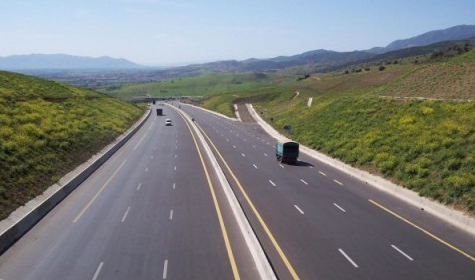
The Century Project.. Algeria announces the completion of a road linking its borders with Tunisia and Morocco
Algeria announced, on Saturday, the completion of the “East-West Highway,” which starts from the country’s western border with Morocco and reaches its eastern border with Tunisia, with a length of 1,216 km.
This came during the inauguration of the Algerian Prime Minister, Ayman bin Abdel Rahman, the last section of the road that connects the city of Daraan (Al-Tarif Governorate in the far east) with the Tunisian border at a distance of 84 km, according to state television.
Thus, Algeria has completely completed the completion of this road, which began to be built at the beginning of the new millennium and was called the “Project of the Century”.
According to official figures of the Algerian government, the total cost of the road exceeded 13 billion dollars, and it was supposed to be completed in 2012.
The project experienced delays due to technical and administrative problems, and at that time a corruption case erupted, known as the “scandal of the century,” and the trials ended in 2015 with the Algerian judiciary issuing prison sentences and financial fines against those involved.
And the Algerian authorities relied on the immediate exploitation of every section of the road that was prepared, until it was completely completed, on Saturday.
Bin Abdul Rahman called for activating road maintenance networks and ensuring that it is suitable for vehicle traffic.
The last section of the road allows for an increase in the volume of trade exchanges with Tunisia, in addition to ensuring the smooth movement of people between the two countries.
The "giant road" is located within an economic and commercial integration scheme drawn up by the Union of Arab Maghreb States, to link the land of Morocco, Algeria and Tunisia, but the differences between Algeria and Rabat and the closure of the land borders between them since 1994 prevented the completion of the road scheme.
And the Algerian Prime Minister, Ayman bin Abdel Rahman, inaugurated the last section of the road, which connects the city of Daraan (Al-Tarif Governorate in the far east) with the Tunisian border, at a distance of 84 kilometers, and thus Algeria has completely completed the completion of this road, which began construction at the beginning of the new millennium, and was named with the "Project of the Century".
The Algerian Prime Minister said that Algeria "now has the longest road network on the continent, with a distance of 141,000 km, of which 9,000 km are highways, according to international standards."
Bin Abdul Rahman called for "activating road maintenance networks and ensuring that it is suitable for vehicle traffic." The last section of the road allows for an increase in the volume of trade exchanges with Tunisia, in addition to ensuring the smooth movement of people between the two countries.
In this regard, bin Abd al-Rahman said that this road is "the artery of the economy, and we are working with an economic approach to endorse development and end isolation," pointing out that "although the Dhara'an section was completed by foreign institutions, the project involved many competencies and hands." qualified Algerian worker.
The East-West Highway is of paramount importance, in terms of the economic, developmental and social dimension, and its completion means the complete opening of the motorway that connects 17 northern Algerian states, out of 58 states, that make up the Algerian Republic, and also connects Algeria with other Arab countries.

























































